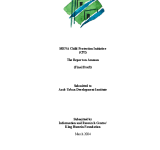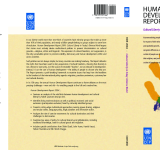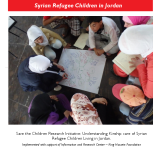report
يقدم هذا الفيديو شرحاً موجزاً حول المركز الوطني لحقوق الإنسان الذي باشر أعماله في الأردن في عام 2003. تتحدث رئيسة وحدة العدالة الجنائية في المركز نسرين زريقات عن المهام التي تشمل استقبال الشكاوى من
This report aims to review the status of children in Greater Amman and to conduct a capacity assessment of key institutions addressing children’s issues. Various issues are examined;; covering areas such as health;; education;; and socio-economic characteristics. This report also reviews the status of disadvantaged children;; including working children;; orphans;; refugees;; and children with disabilities;; in order to identify vulnerabilities and risk factors specific to them. Finally;; this report assesses the capacity of selected institutions addressing children’s issues in Greater Amman and proposes phased capacity building programs based on the findings of the assessment.
This report addressed CEDAW Committee by providing a solid and up-to-date information set and analysis of positive policies and legislation taken for women’s advancement and weaknesses that are delaying progress and sustaining disparities. The report covers six components: 1. Jordan’s reservations on CEDAW;; 2. Harmonization of CEDAW into legislation;; 3. Political representation;; 4. Violent against women;; 5. Equal rights in the family;; 6. Conditions of vulnerable and marginalized women. It also provides an overall assessment of the six components covering 3 areas: assessment of the official efforts towards the implementation of CEDAW;; also;; assessment of the civil society efforts and strategies towards monitoring Jordan’s commitment to obligations;; and suggested recommendations for the new concluding observations.
وجه هذا التقرير إلى لجنة سيداو من أجل توفير أحد المعلومات وأكثرها دقة;; بالإضافة إلى دراسة وتحليل السياسات الإيجابية والتشريعات المتخذة في سبيل تقدم ونهوض المرأة وإيجاد مواطن الضعف التي تعمل على تأخير التطور;; وتساه مفي تعزيز التفاوت وعدم المساواة. ويتكون التقرير من ستة مكونات رئيسية: 1. تحفظات الأردن على اتفاقية سيداو;; 2. مواءمة اتفاقية سيداو مع التشريعات الوطنية;; 3. التمثيل السياسي للنساء;; 4. العنف ضد النساء;; 5. الحقوق المتساوية للنساء في العائلة;; 6. أوضاع النساء الضعيفات والمهمشات. ويوفر التقرير تقييماً شاملا للمكونات الستة وذلك من خلال تقييم الجهود الرسمية في سبيل تطبيق اتفاقية سيداو;; وتقييم جهود المجتمع المدني تجاه رصد مراقبة التزام الأردن بالمواثيق الدولية;; إلى جانب تقديم توصيات مقترحة للملاحظات الختامية الجديدة.
Accommodating people's growing demands for their inclusion in society;; for respect of their ethnicity;; religion;; and language;; takes more than democracy and equitable growth. Also needed are multicultural policies that recognize differences;; champion diversity and promote cultural freedoms;; so that all people can choose to speak their language;; practice their religion;; and participate in shaping their culture—so that all people can choose to be who they are. In recent years the Human Development Report has argued strongly that this is as much a question of politics as economics—from protecting human rights to deepening democracy. Human development is first and foremost about allowing people to lead the kind of life they choose—and providing them with the tools and opportunities to make those choices. The 2004 Report builds on that analysis;; by carefully examining—and rejecting—claims that cultural differences necessarily lead to social;; economic and political conflict or that inherent cultural rights should supersede political and economic ones. Instead;; it provides a powerful argument for finding ways to “delight in our differences”;; as Archbishop Desmond Tutu has put it. It also offers some concrete ideas on what it means in practice to build and manage the politics of identity and culture in a manner consistent with the bedrock principles of human development.
Throughout history water has confronted humanity with some of its greatest challenges. Water is a source of life and a natural resource that sustains our environments and supports livelihoods – but it is also a source of risk and vulnerability. In the early 21st Century;; prospects for human development are threatened by a deepening global water crisis. Debunking the myth that the crisis is the result of scarcity;; this report argues poverty;; power and inequality are at the heart of the problem.The 2006 Human Development Report continues to frame debates on some of the most pressing challenges facing humanity.
his 2005 Human Development Report takes stock of human development;; including progress towards the MDGs. Looking beyond statistics;; it highlights the human costs of missed targets and broken promises. Extreme inequality between countries and within countries is identified as one of the main barriers to human development—and as a powerful brake on accelerated progress towards the MDGs. The report suggests that the world's governments are faced with a choice. They can start a decade for development with the financial resources;; technology and capacity to end poverty or we could have a human development failure. “Business as usual” will not allow fulfilling the promises and the commitments made in 2000. The cost of this failure will be measured in human lives;; increased inequalities;; violations of human rights and threats to peace.





